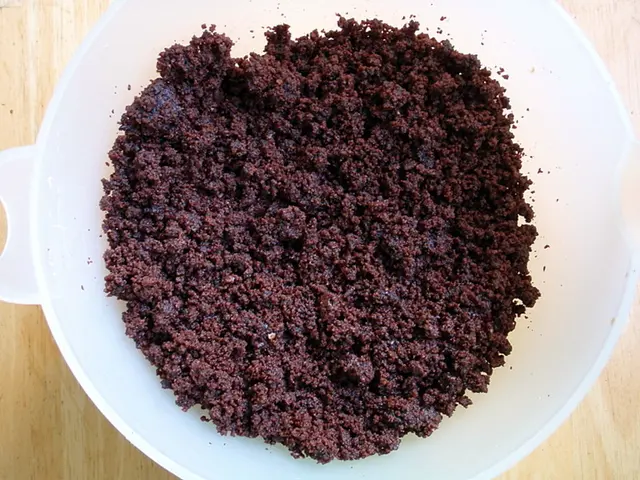Esophagus Inflammation: Causes, Signs, and Remedies Detailed
Esophageal Troubles: Living with Reflux Esophagitis
That burning sensation in your chest after meals? It might be more than just heartburn. It could be reflux esophagitis, a condition caused by stomach acid regularly rising up into the esophagus, leading to irritation and inflammation. Here's what you should know about the causes, symptoms, and ways to manage this pesky issue.
Get to the Root Cause
Reflux esophagitis often arises from the loosening or relaxing of the lower esophageal sphincter (LES), the muscle that typically prevents acid from spilling into the esophagus. Some common factors that lead to LES malfunction include:
- Having a couple extra pounds in your midsection can increase the pressure on your abdomen, weakening the LES and increasing the risk of acid reflux [4][5].
- Smoking weakens the LES and impairs its ability to prevent acid reflux [5].
- Pregnancy can cause hormonal shifts that relax the LES and boost intra-abdominal pressure, resulting in acid backwash [1].
- In some cases, a hiatal hernia can occur when a part of the stomach moves above the diaphragm, affecting LES function [4][5].
- Certain dietary choices, such as fatty or fried foods, alcohol, caffeine, and acidic food items, can trigger acid reflux [4][5].
- Some medications, like certain pain relievers and certain medications for high blood pressure, can irritate the stomach or relax the LES [2][5].
Spot the Symptoms
Reflux esophagitis symptoms may vary from person to person, but they often include [1]:
- Heartburn, a burning sensation in the chest that may worsen after meals or at night.
- Regurgitation, the backwash of food or sour liquid into the mouth.
- Pain or discomfort in the upper abdomen or chest, sometimes mistaken for a heart attack [1].
- Difficulty swallowing or a sensation of food getting stuck in the throat.
- A feeling of a lump or tightness in the throat.
- A chronic cough, particularly at night.
- Hoarseness or changes in the voice.
- New or worsening asthma symptoms [1].
If you experience severe chest pain, especially accompanied by shortness of breath, jaw or arm pain, seek immediate medical attention, as these may be warning signs of a heart attack.
Seeking a Diagnosis
If you suspect reflux esophagitis, consult a healthcare professional for an accurate diagnosis. Your doctor may use various diagnostic tests, such as upper endoscopy, esophageal pH monitoring, and esophageal manometry to assess the situation [1].
Treatment Options
Managing reflux esophagitis involves relieving symptoms, promoting healing of the esophagus, and preventing complications. Treatment options might involve [1]:
- Making lifestyle adjustments to minimize acid reflux, such as avoiding trigger foods, maintaining a healthy weight, and quitting smoking.
- Using over-the-counter medications like antacids, H2 blockers, and proton pump inhibitors (PPIs) to reduce stomach acid and help the esophagus heal.
- In severe cases, undergoing surgical procedures, like fundoplication, which aims to strengthen the LES and prevent acid reflux.
- Regular check-ups with your healthcare provider to monitor your condition, evaluate treatment effectiveness, and update your treatment plan as needed.
Potential Complications
Should reflux esophagitis go untreated, it could lead to several complications, including esophagitis, esophageal strictures, Barrett's esophagus (a precancerous condition), and, in rare cases, esophageal cancer.
In conclusion, reflux esophagitis is a troublesome condition caused by stomach acid regularly traveling to the esophagus. By understanding its symptoms, seeking early diagnosis, and adopting appropriate management strategies, you can maintain a better quality of life and address the discomfort caused by reflux esophagitis. Consult a healthcare professional for a personalized treatment plan if you suspect this issue might be affecting you.
FAQs:
1. What is reflux esophagitis, and what causes it? Reflux esophagitis is inflammation of the esophagus caused by stomach acid frequently flowing back into the esophagus, often due to factors such as a weak lower esophageal sphincter (LES) or contributing factors like obesity, smoking, and certain dietary choices [4][5].
2. What are the common symptoms of reflux esophagitis? Symptoms may include heartburn, chest pain, difficulty swallowing, a sour taste in the mouth, and regurgitation of food or liquids [1].
3. What lifestyle changes can help manage reflux esophagitis? Adopting a healthier lifestyle can help minimize acid reflux. This may include avoiding trigger foods, maintaining a healthy weight, quitting smoking, and making changes to your eating habits like eating smaller meals, avoiding lying down after eating, and elevating the head of your bed [1].
4. What medications are commonly used to treat reflux esophagitis? Over-the-counter medications like antacids and prescription medications like H2 blockers and proton pump inhibitors (PPIs) are often used to reduce stomach acid and promote healing of the esophagus.
5. Can reflux esophagitis lead to complications if untreated? If left untreated, reflux esophagitis could lead to complications like esophagitis, esophageal strictures, or the precancerous condition, Barrett's esophagus [1].
- Maintaining a health-conscious lifestyle is crucial for reducing the risk of medical conditions, including reflux esophagitis, caused by a malfunctioning lower esophageal sphincter (LES).
- Weight management and a balanced diet can minimize the pressure on the abdomen, helping the LES function effectively and prevent acid reflux.
- Adopting fitness and exercise habits, such as regular workouts, can improve overall health-and-wellness while reducing the risk of chronic diseases like reflux esophagitis.
- Preventing and managing medical-conditions like reflux esophagitis requires a focus on nutrition, ensuring that the body receives the essential nutrients it needs.
- Skin-care routines should not be overlooked, as they play a role in overall health and wellness, making the skin less susceptible to conditions caused by irritants that might trigger reflux esophagitis.
- Proper self-care, including mental-health management, can help individuals better cope with the discomfort and stress associated with chronic diseases like reflux esophagitis.
- Mens-health issues, including heart- and cardiovascular-health, can indirectly impact the likelihood of developing reflux esophagitis due to hormonal imbalances or associated risk factors.
- Womens-health concerns, such as hormonal changes during pregnancy or hormone replacement therapy, can potentially influence the development and management of reflux esophagitis.
- Early detection and treatment of skin-conditions like eczema or rosacea can prevent irritants from entering the body and potentially triggering reflux esophagitis symptoms.
- Hearing health is essential, as poor oral health or frequent use of certain nasal sprays can lead to increased phlegm production and potentially worsen reflux esophagitis symptoms.
- Effective parenting involves promoting eye-health, maintaining a well-balanced diet, and addressing potential respiratory- or digestive-health concerns that could impact a child's health and increase their risk of developing reflux esophagitis.
- Medical-conditions like neurological-disorders and autoimmune-disorders can indirectly influence the development or worsening of reflux esophagitis due to associated risk factors or complications.
- Therapies-and-treatments like CBD oil may offer potential relief for certain symptoms associated with reflux esophagitis, although further research is needed to confirm its effectiveness.
- Addressing aging-related issues, such as accommodation difficulties or slowed digestion, can help reduce the risk of reflux esophagitis among older individuals.
- Regular check-ups with healthcare providers – including those offering Medicare – can ensure that appropriate management strategies are in place to address reflux esophagitis or other health concerns that may arise as you age.








